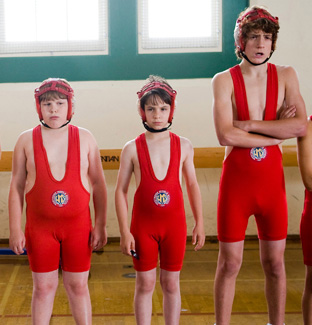Your head is forcibly dunked into the water of the gurgling toilet bowl again as you hear the laughter of your tormentors echoing cruelly from the bathroom walls.but this is not Guantanamo. This is not a prison you are in. This is the eighth grade and you my friend, are being hazed. The “swirly,” the “wedgie,” the ever popular book-bag-tossed-onto-the-roof; if you don’t remember these eight grade terrors or if you’re just blocking them out, “Diary of a Wimpy Kid” will bring them back faster than you can get to second base in your parents family room.
Eight grade, also aptly referred to as “middle school” marks the period of a young persons life when they are indeed ‘in-the-middle’; wedged between their newly raging hormones, and a vicious horde of merciless upperclassmen intent on making their life miserable. Not old enough to demand independence and too old to be coddled like a child, we are tossed to the lions of puberty and avarice in the bloody octagon of middle school.
Based on the New York Times best-selling, autobiographical series by Jeff Kinney, “Diary of a Wimpy Kid” chronicles the writer/executive-producers trials and tribulations as he embarks on the universally awkward journey of self-discovery that is middle-school.
The film opens on the main characters first day of middle school, and builds to a beautiful crescendo of tension and embarrassment, and finally social suicide as he attempts to redefine himself over the course of the semester. Saddled with a rotund, ginger-haired dork named Rowley for a best friend and a bike with streamers on the handlebars, Greg (Zachary Gordon) attempt to re-invent himself in the terrifying new environment as an athlete, a lothario, a safety-patrol officer and a thespian, all with hilariously disastrous results. Kinney’s masterful rendering of a cast of characters that is at once quintessentially familiar and yet refreshingly unique has you wondering if they weren’t plucked straight from the diary Greg totes throughout the tale. The film is refreshingly absent of Dakota Fanning or any other young megastar which lends further authenticity to the main characters experiences. Kinney also uses fantasy sequences of the main character with surgeon-like precision to remind us of a time when we were all putting on the bravest of faces in the midst of crushing insecurity, all the while fantasizing about impressing the right girl, besting the bully, or winning the award.
At times the pace is somewhat formulaic and the storyline threatens to fall into the category of a two-hour episode of “Malcolm-in-the-middle”, but the saving grace of the tale is the utter despair of the main character and our ability to relate to his mortification. Let ye cast the first stone that has not fantasized about the decimation of your eight-grade rival for stealing the last seat at the cool-kids lunch-table. The message of the film spans a wide target market as easily as a Harry Potter film, in that the audience is either experiencing it, remembers it, or is experiencing the same melodrama at a different phase of their life. The universal desire to “fit in” is the most human fallibility that exists. Our attempts to gain acceptance in a wide variety of circumstances transcends age.
Movie studios are scratching at the dirt looking for scripts to fill the Harry Potter void, as evidenced by the fact that the book series only debuted in April of 2007, and it’s already on the silver screen. With no expensive special effects and no big names, this film and ones like it are a slam-dunk for studio execs.
The ancient Greeks said that there are only 36 themes, and that all stories written are a derivative of one of those themes. The story of a young person struggling to come to terms with their identity is hardly a new tale, but “Wimpy Kid” is rock-solid proof that it isn’t the story itself that succeeds, it’s the storyteller. The recently deceased John Hughes (Sixteen Candles, Breakfast Club) would be proud to call this one his own.

